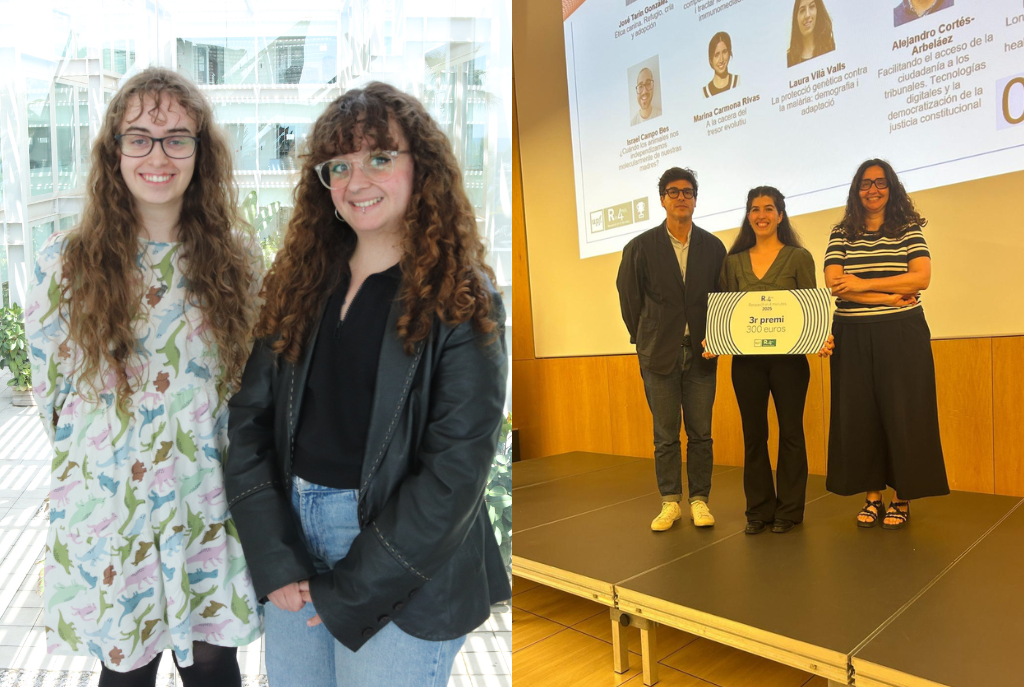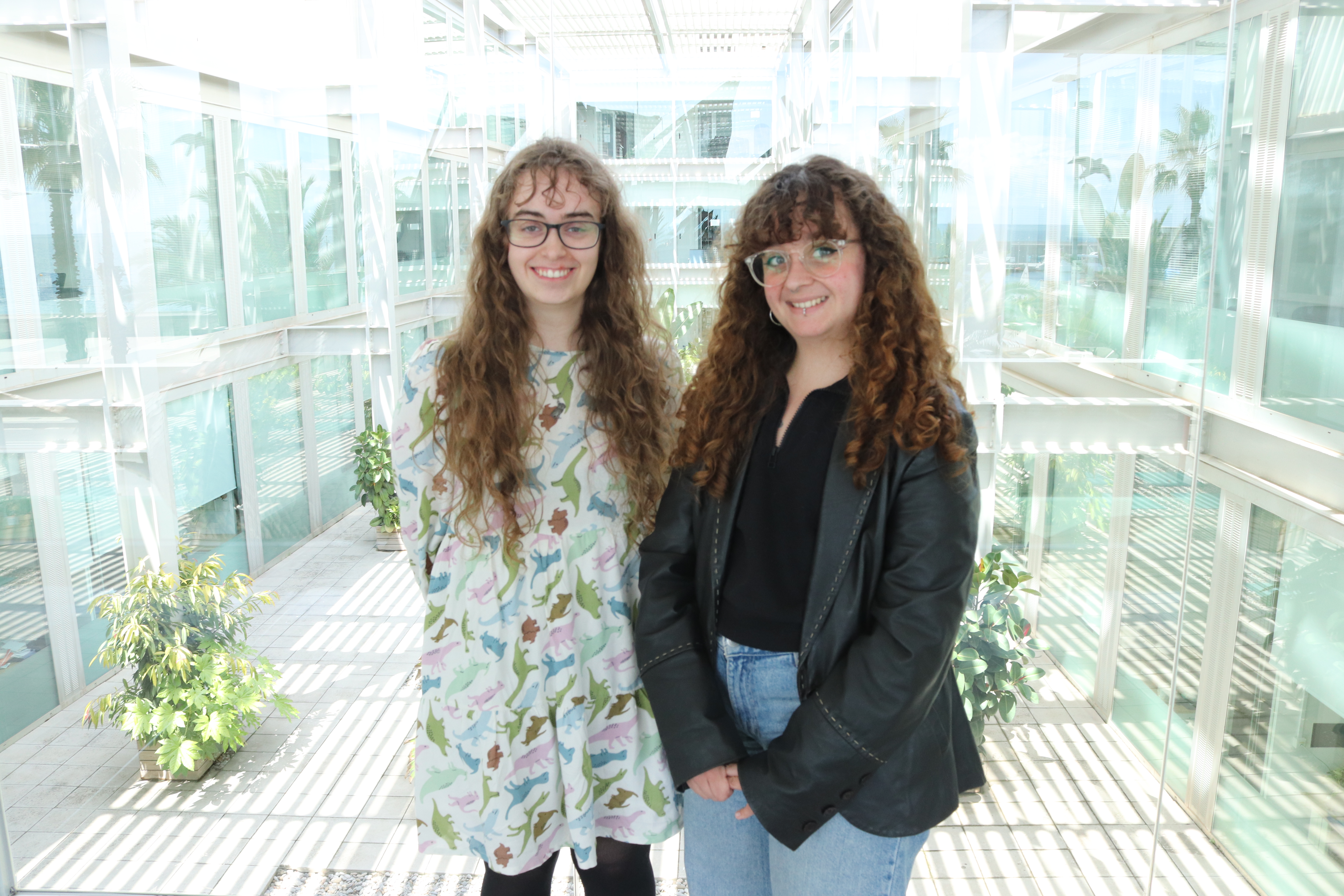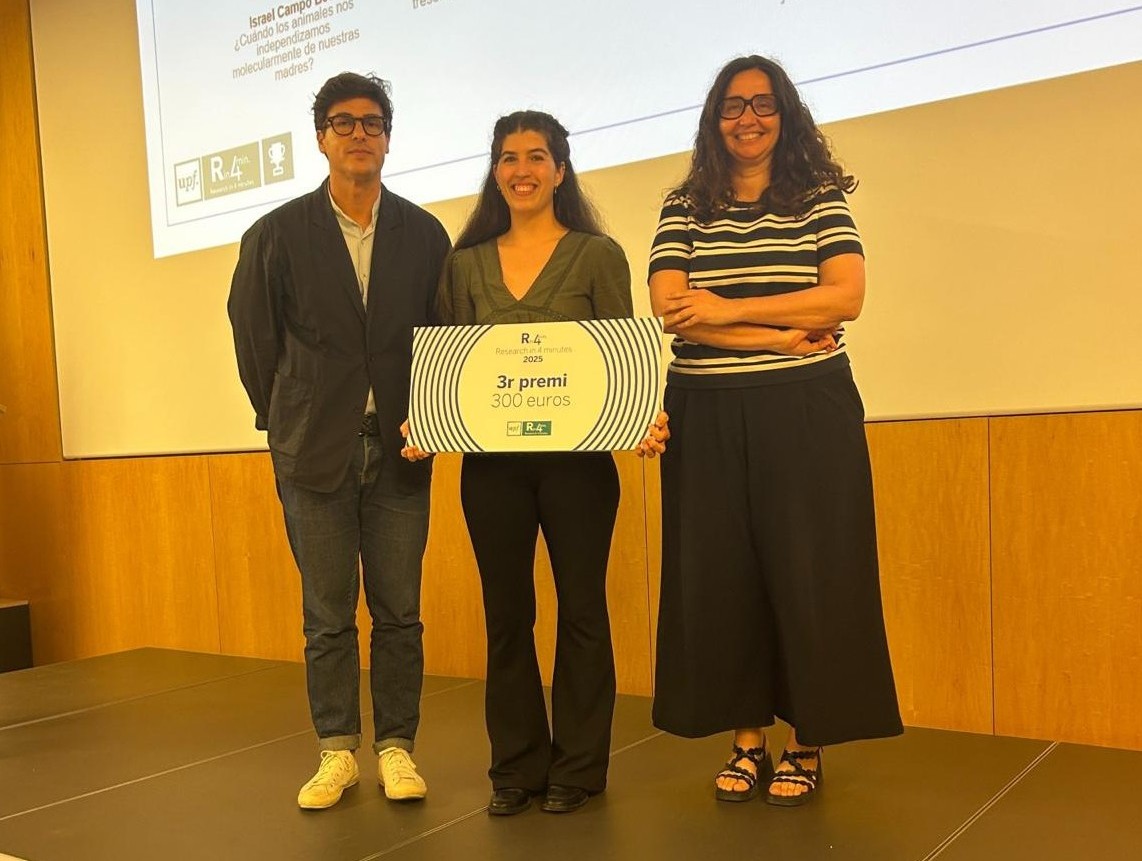Recognition for IBE PhD Students in 2025
Recognition for IBE PhD Students in 2025

In 2025, three PhD students from the Institute of Evolutionary Biology (IBE)—a joint center of the Spanish National Research Council (CSIC) and Pompeu Fabra University (UPF)—have been recognized for the excellence of their research. Alba Nieto and Gemma Martínez have received the SMBE Graduate Student Excellence Award, and Laura Vilà Valls has won third prize in the 2025 edition of Rin4min, organized by UPF, where Marina Carmona was also distinguished as a finalist.
Alba Nieto Heredia and Gemma Martínez Redondo awarded by the Society for Molecular Biology & Evolution
The IBE doctoral students are among eight individuals honored this year with the 2025 Graduate Student Excellence Award. Presented by the Society for Molecular Biology & Evolution (SMBE), this award recognizes innovative and creative research with the potential to significantly advance the fields of molecular biology and evolution during the early stages of a scientific career.
Alba Nieto and Gemma Martínez will receive the award, which includes a €500 prize, at the SMBE Annual Meeting, held from July 20 to 24 in Beijing, China, and hosted by the Chinese Academy of Sciences. They will also present their work in 15-minute talks to the international scientific community.

Gemma Martínez and Alba Nieto at the IBE
Alba Nieto Heredia: Demographic inference and population structure
Alba Nieto Heredia is pursuing her PhD within the European AI4TheSciences doctoral program, co-funded by MSCA-Horizon2020 and Université PSL (Paris Sciences et Lettres). Her project is carried out jointly at the National Museum of Natural History in Paris and the Algorithms for Population Genomics group at IBE, led by Óscar Lao.
Her research focuses on population genetics and computational biology, exploring how population structure affects demographic inference models.
“I focus on studying demographic inference in structured populations, designing statistics that accurately summarize information from whole-genome sequences, and developing new methods to model coalescence and recombination using machine learning and neural networks. My goal is to create tools that contribute to species conservation research,” explains Alba Nieto.
Gemma Martínez Redondo: Genomics of the transition from sea to land
Gemma Martínez Redondo is completing her PhD in the Metazoa Phylogenomics and Genome Evolution group, led by Rosa Fernández at IBE. Her work combines classical phylogenetics, phylogenomics, and machine learning to understand the genomic basis of terrestrialization in animals.
“My research aims to understand which genes may have enabled different animal groups to transition from aquatic to terrestrial environments independently,” says Gemma Martínez.
She has also been selected as a finalist for the prestigious W.D. Hamilton Award for Best Graduate Student Presentation from the Society for the Study of Evolution (SSE), and recently gave a talk on her thesis at the virtual Evolution Annual Meeting, held on May 29.
Laura Vilà Valls awarded at Rin4min for her presentation on genetics and malaria
Laura Vilà Valls, a PhD student in the Human Genome Diversity Lab at IBE, led by David Comas, won third prize at the 2025 Rin4min competition for her presentation titled “Genetic Protection Against Malaria: Demography and Adaptation.” The annual contest, organized by Pompeu Fabra University, challenges PhD students to present their research in under four minutes in a fun and accessible way for a non-specialist audience.
“Did you know our DNA can change to help us fight certain diseases?” she asked at the beginning of her talk.

Laura Vilà Valls at the Rin4min
Her research examines the relationship between genetics and resistance to malaria, a disease that caused over half a million deaths in 2023, according to the WHO. Vilà explained that a genetic mutation common in many African populations prevents the production of a protein essential for the Plasmodium vivax parasite—one of the agents of malaria—to infect human cells. This absence acts like a natural shield.
This discovery provides deeper insight into genetic adaptation processes and may have implications for personalized medicine. As Vilà concluded:
“By studying human genetic diversity, we can understand how our species adapts and survives in different environments.”
You can watch her presentation here: https://www.youtube.com/watch?v=cNP19Wru2pk
In this same edition of Rin4min, Marina Carmona Rivas, a PhD student at the Multicellgenome Lab of the IBE, was also selected as a finalist for her presentation titled “In Search of the Evolutionary Treasure”, a science communication talk on the origins of multicellularity.
